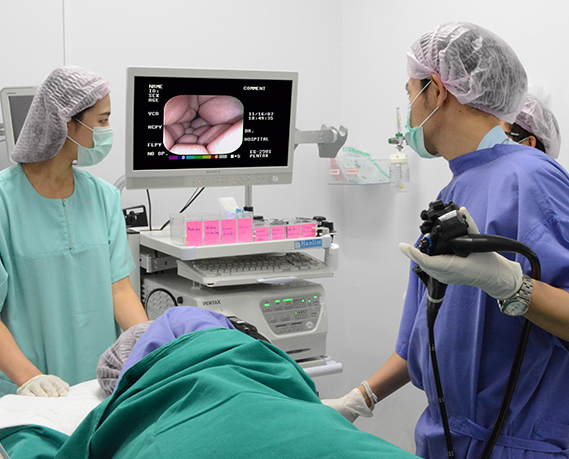
Endoscopy/ Colonoscopy /Gastroscopy Unit

Endoscopy Unit
Endoscopy is a way of looking inside the body using a flexible tube that has a small camera on the end of it. This instrument is called an endoscope.
This can be through the mouth into the stomach (gastroscopy), through the anus into the large bowel (colonoscopy), through the nose into the lungs (bronchoscopy), or through the urethra to the bladder (cystoscopy).
Another examination that is performed by the endoscopy staff is ERCP (endoscopic retrograde cholangiopancreatography). A dye is injected into the bile and pancreatic ducts using a flexible, video endoscope. Then x-rays are taken to outline the bile ducts and pancreas.
How this program helps...
We provide acute care to both the inpatient and outpatient populations, as well as screening procedures for diagnostic and preventative purposes.
The Endoscopy Unit provides a broad range of endoscopic services including:
- Gastroscopy
- Enteroscopy
- Colonoscopy
- Flexible Sigmoidoscopy
- Endoscopic Retrograde Cholangiography (ERCP)
- Acute management of gastrointestinal bleeding
- Hemorroidal banding
Conditions treated
- Barretts Oesophagus
- Stomach cancer – early and advanced
- Oeosphageal cancer
- Gastro-intestinal stroma tumours of the upper intestinal tract
- Gasto-oesophageal reflux disease (GORD)
- Hiatus hernias
- Achalasia
- Gastroparesis
- Bile duct stones
- Primary sclerosing cholangitis
- Cholangiocarcinoma
- Pancreatic cancer
- Pancreatic cysts
- Colon cancer and polyps
- Crohns disease and ulcerative colitis
What happens on the day of your procedure?
After a short admission procedure where we will discuss the procedure you are to have, we will ask you some questions about your general health and also check your blood pressure. You will be given the opportunity to decide if you would like to have the procedure with or without sedation. We will inform you of the pros and cons of having sedation or not having sedation, but leave the choice up to you. We can now also offer the use of Entonox (gas and air) instead of sedation for colonoscopy and sigmoidoscopy. Using Entonox means that you will be able to drive yourself home half an hour after the procedure.
If you are going to have a camera test of your bowel we will ask you to change into a theatre gown.
You will then be taken to have the procedure and once completed you will return to our recovery ward, where you recovery will be monitored by nurses. Once you have recovered we will offer you a cup of tea before discussing your procedure report with you.
Who will be doing my procedure?
All the staff who carry out the procedures have being specially trained in endoscopy. While most are qualified doctors we do have two nurses who have specialised in doing endoscopy procedures. The training of all the doctors and nurses is carried out according to national standards, and no-one is allowed to do a procedure unsupervised unless they have completed our comprehensive training programme.
How long will my procedure take?
While the procedures are fiarly short (up to an hour for colonoscopy) we always advise that you may be with us for up to four hours. In most cases this will be a lot shorter.
How will I be after the procedure?
Once you have recovered sufficiently you will be allowed to go home. If you have had sedation we strongly advise that you have someone stay with you overnight, as the effects of the sedation can last for up to 24 hours.
Patient aftercare
Patient aftercare is dependent on nature of the condition. Some patients will be suitable to be managed in the community by their GP, some will require ongoing hospital visits, and some will be discharged after treatment.
Your Care Team
The Endoscopy Unit consists of trained and accredited endoscopists, trained nursing and support staff.